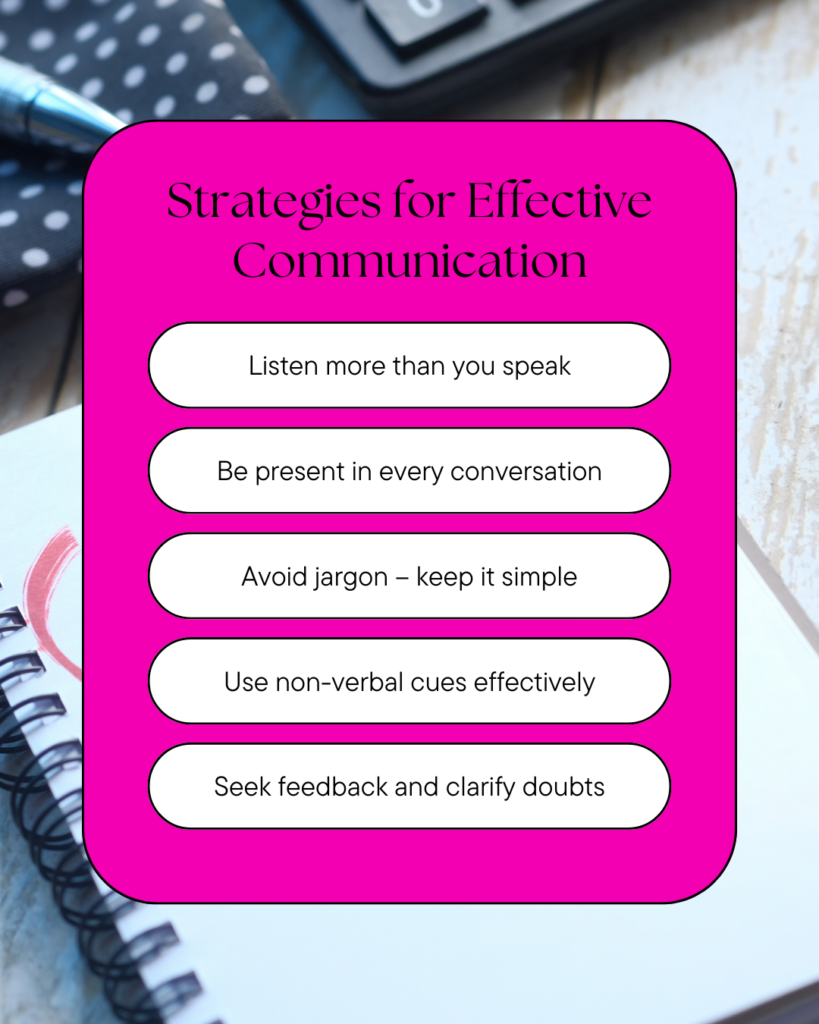Communication: Why It's Not as Obvious as We Think
Effective communication is often taken for granted, yet it is a nuanced skill that requires conscious effort and understanding. While many assume that simply talking to others suffices, the reality is that true communication encompasses much more than just exchanging words.
As a leader, your communication can make or break your team. When you get it right, it builds trust and engagement, creating a positive vibe that energises everyone. Your words can inspire your team to work together toward common goals, making them feel valued and part of something bigger. It’s amazing how effective communication can turn a group of individuals into a cohesive unit where creativity and productivity thrive.
On the flip side, when communication goes awry, the fallout can be tough. Misunderstandings or unclear directions can lead to confusion and frustration among team members. If you’re not communicating effectively, it can erode trust and spark resentment, which often bubbles up as complaining or gossip. That kind of negativity can create a toxic atmosphere that stifles innovation and dampens morale. So, as a leader, it’s a definite area to sharpen your skills. For your own sake, and for the health and success of your entire team.
In this video Merinda discusses communication and owning it.
Taking Responsibility for Your Message
When you own your communication, you strive for clarity in your message, so that others can understand your meaning. This means carefully considering what you want to say and how best to express it. When you take the time to organise your thoughts and choose your words deliberately, it allows you to align your intention with your delivery. Before important conversations or presentations, take time to outline your key points. Consider potential questions or objections and prepare responses.
Adapting your communication style to your audience is also essential; what works for a team meeting may not be appropriate for a client presentation or a one-on-one conversation with a colleague. To avoid ambiguity, steer clear of vague statements and provide concrete details that illustrate your points. Creating an environment where others feel comfortable asking for clarification fosters open communication and helps prevent misunderstandings before they occur. By prioritising clarity and understanding, you demonstrate respect for your audience and enhance the effectiveness of your interactions.
Owning your communication means moving away from blame language and instead using “I” statements. For example, instead of saying “You made me angry,” you might say “I feel angry when this happens.” This approach acknowledges your feelings without attacking the other person.
Authenticity and Vulnerability
Authentic communication involves being true to yourself and your values. It means expressing your genuine thoughts and feelings, even when it’s uncomfortable. Sometimes it means being vulnerable and being willing to admit mistakes, to say you don’t know, express uncertainties, and ask for help when needed.
Even though this can be a hard part for new leaders, the act of vulnerability can lead to more honest and productive interactions.
Active Listening and Feedback
Owning your communication isn’t just about talking; it’s about being fully present in conversations. This means you’re not just waiting for your turn to speak, instead you’re really tuning in to what others are saying. Let’s face it, listening can be tough for some of us. We might be itching to jump in with our own thoughts or find our minds wandering. Yet when you make a conscious effort to listen attentively, you’re showing respect and genuine interest in others’ perspectives.
And if you aren’t sure what was said then ask thoughtful questions and seek clarification. You might say something like, “Can you help me understand that better?” or “What do you mean when you say…?” This kind of engagement shows you’re not just hearing words, you’re trying to grasp the full meaning behind them.
Now, let’s talk about feedback. Being open to feedback means you’re willing to hear how your communication lands with others. asking for this feedback is not always comfortable, yet it’s incredibly valuable. You might ask, “How did that come across to you?” or “Is there a way I could have expressed that more clearly?” Remember, your words and actions have real consequences, even when you didn’t mean for them to. Taking responsibility for how your communication affects others is a big part of personal growth.
Once you’ve got that feedback, the real work begins. It’s about being willing to adjust and improve based on what you’ve learned. Maybe you realise you tend to interrupt others or that your body language doesn’t always match your words. Whatever it is, use that feedback as a tool for improvement. If your communication has a negative impact, be willing to apologise and make amends. It’s not about beating yourself up; it’s about continually refining your communication skills.
Self-Reflection
Regularly reflecting on your communication style and effectiveness is a key part of owning it. This involves analysing your interactions, identifying areas for improvement, and setting goals for growth.
Owning your communication means committing to ongoing learning and skill development. This could involve reading books on communication, attending workshops, or seeking mentorship to enhance your abilities.
Listening
let’s have a bit of fun. The following is a list of bad habits of listening. Read the points, and check those listening bad habits that you are sometimes guilty of committing when communicating with others. Even if it’s sometimes…
Be honest with yourself!
- I interrupt often or try to finish the other person’s sentences.
- I’ve been known to jump in with advice or solutions before the speaker has finished sharing their thoughts
- I sometimes assume I know what the speaker is thinking or feeling without them explicitly sharing their thoughts
- I interrupt to say what I need to say before I forget
- I sometimes check my phone or other devices during a conversation
- I jump to conclusions.
- There are times when my mind wanders while someone is talking, resulting in missed information and a lack of engagement in the conversation.
- I sometimes disregard the speaker’s body language, tone of voice, or facial expressions
- I think more about my reply while the other person is speaking than what he or she is saying.
- I focus on parts of the conversation that interest me and tune out the rest.
- I sometimes become defensive or take things personally when receiving feedback or criticism
Now count up how many you do, and write down that number.
7 to 11 means you’ve got much work to do,
4 to 6 Well done, how else can you improve?
Less then 4 – Awesome work! Keep up the awareness and look for more ways to improve.
Whatever the score, try to reduce it.

